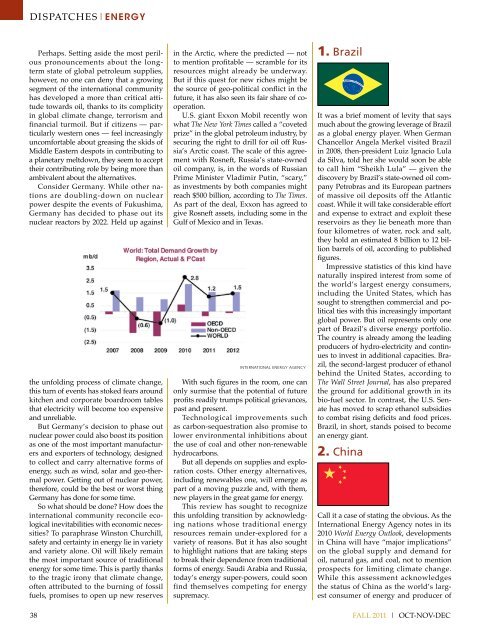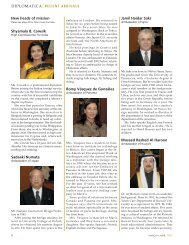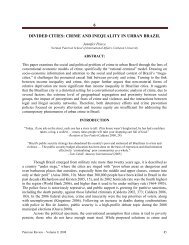the new petro power paradigm - Diplomat Magazine
the new petro power paradigm - Diplomat Magazine
the new petro power paradigm - Diplomat Magazine
Create successful ePaper yourself
Turn your PDF publications into a flip-book with our unique Google optimized e-Paper software.
Di spatches|ENERGY<br />
Perhaps. Setting aside <strong>the</strong> most perilous<br />
pronouncements about <strong>the</strong> longterm<br />
state of global <strong>petro</strong>leum supplies,<br />
however, no one can deny that a growing<br />
segment of <strong>the</strong> international community<br />
has developed a more than critical attitude<br />
towards oil, thanks to its complicity<br />
in global climate change, terrorism and<br />
financial turmoil. But if citizens — particularly<br />
western ones — feel increasingly<br />
uncomfortable about greasing <strong>the</strong> skids of<br />
Middle Eastern despots in contributing to<br />
a planetary meltdown, <strong>the</strong>y seem to accept<br />
<strong>the</strong>ir contributing role by being more than<br />
ambivalent about <strong>the</strong> alternatives.<br />
Consider Germany. While o<strong>the</strong>r nations<br />
are doubling-down on nuclear<br />
<strong>power</strong> despite <strong>the</strong> events of Fukushima,<br />
Germany has decided to phase out its<br />
nuclear reactors by 2022. Held up against<br />
<strong>the</strong> unfolding process of climate change,<br />
this turn of events has stoked fears around<br />
kitchen and corporate boardroom tables<br />
that electricity will become too expensive<br />
and unreliable.<br />
But Germany’s decision to phase out<br />
nuclear <strong>power</strong> could also boost its position<br />
as one of <strong>the</strong> most important manufacturers<br />
and exporters of technology, designed<br />
to collect and carry alternative forms of<br />
energy, such as wind, solar and geo-<strong>the</strong>rmal<br />
<strong>power</strong>. Getting out of nuclear <strong>power</strong>,<br />
<strong>the</strong>refore, could be <strong>the</strong> best or worst thing<br />
Germany has done for some time.<br />
So what should be done? How does <strong>the</strong><br />
international community reconcile ecological<br />
inevitabilities with economic necessities?<br />
To paraphrase Winston Churchill,<br />
safety and certainty in energy lie in variety<br />
and variety alone. Oil will likely remain<br />
<strong>the</strong> most important source of traditional<br />
energy for some time. This is partly thanks<br />
to <strong>the</strong> tragic irony that climate change,<br />
often attributed to <strong>the</strong> burning of fossil<br />
fuels, promises to open up <strong>new</strong> reserves<br />
38<br />
in <strong>the</strong> Arctic, where <strong>the</strong> predicted — not<br />
to mention profitable — scramble for its<br />
resources might already be underway.<br />
But if this quest for <strong>new</strong> riches might be<br />
<strong>the</strong> source of geo-political conflict in <strong>the</strong><br />
future, it has also seen its fair share of cooperation.<br />
U.S. giant Exxon Mobil recently won<br />
what The New York Times called a “coveted<br />
prize” in <strong>the</strong> global <strong>petro</strong>leum industry, by<br />
securing <strong>the</strong> right to drill for oil off Russia’s<br />
Arctic coast. The scale of this agreement<br />
with Rosneft, Russia’s state-owned<br />
oil company, is, in <strong>the</strong> words of Russian<br />
Prime Minister Vladimir Putin, “scary,”<br />
as investments by both companies might<br />
reach $500 billion, according to The Times.<br />
As part of <strong>the</strong> deal, Exxon has agreed to<br />
give Rosneft assets, including some in <strong>the</strong><br />
Gulf of Mexico and in Texas.<br />
International Energy Agency<br />
With such figures in <strong>the</strong> room, one can<br />
only surmise that <strong>the</strong> potential of future<br />
profits readily trumps political grievances,<br />
past and present.<br />
Technological improvements such<br />
as carbon-sequestration also promise to<br />
lower environmental inhibitions about<br />
<strong>the</strong> use of coal and o<strong>the</strong>r non-re<strong>new</strong>able<br />
hydrocarbons.<br />
But all depends on supplies and exploration<br />
costs. O<strong>the</strong>r energy alternatives,<br />
including re<strong>new</strong>ables one, will emerge as<br />
part of a moving puzzle and, with <strong>the</strong>m,<br />
<strong>new</strong> players in <strong>the</strong> great game for energy.<br />
This review has sought to recognize<br />
this unfolding transition by acknowledging<br />
nations whose traditional energy<br />
resources remain under-explored for a<br />
variety of reasons. But it has also sought<br />
to highlight nations that are taking steps<br />
to break <strong>the</strong>ir dependence from traditional<br />
forms of energy. Saudi Arabia and Russia,<br />
today’s energy super-<strong>power</strong>s, could soon<br />
find <strong>the</strong>mselves competing for energy<br />
supremacy.<br />
1. Brazil<br />
It was a brief moment of levity that says<br />
much about <strong>the</strong> growing leverage of Brazil<br />
as a global energy player. When German<br />
Chancellor Angela Merkel visited Brazil<br />
in 2008, <strong>the</strong>n-president Luiz Ignacio Lula<br />
da Silva, told her she would soon be able<br />
to call him “Sheikh Lula” — given <strong>the</strong><br />
discovery by Brazil’s state-owned oil company<br />
Petrobras and its European partners<br />
of massive oil deposits off <strong>the</strong> Atlantic<br />
coast. While it will take considerable effort<br />
and expense to extract and exploit <strong>the</strong>se<br />
reservoirs as <strong>the</strong>y lie beneath more than<br />
four kilometres of water, rock and salt,<br />
<strong>the</strong>y hold an estimated 8 billion to 12 billion<br />
barrels of oil, according to published<br />
figures.<br />
Impressive statistics of this kind have<br />
naturally inspired interest from some of<br />
<strong>the</strong> world’s largest energy consumers,<br />
including <strong>the</strong> United States, which has<br />
sought to streng<strong>the</strong>n commercial and political<br />
ties with this increasingly important<br />
global <strong>power</strong>. But oil represents only one<br />
part of Brazil’s diverse energy portfolio.<br />
The country is already among <strong>the</strong> leading<br />
producers of hydro-electricity and continues<br />
to invest in additional capacities. Brazil,<br />
<strong>the</strong> second-largest producer of ethanol<br />
behind <strong>the</strong> United States, according to<br />
The Wall Street Journal, has also prepared<br />
<strong>the</strong> ground for additional growth in its<br />
bio-fuel sector. In contrast, <strong>the</strong> U.S. Senate<br />
has moved to scrap ethanol subsidies<br />
to combat rising deficits and food prices.<br />
Brazil, in short, stands poised to become<br />
an energy giant.<br />
2. China<br />
Call it a case of stating <strong>the</strong> obvious. As <strong>the</strong><br />
International Energy Agency notes in its<br />
2010 World Energy Outlook, developments<br />
in China will have “major implications”<br />
on <strong>the</strong> global supply and demand for<br />
oil, natural gas, and coal, not to mention<br />
prospects for limiting climate change.<br />
While this assessment acknowledges<br />
<strong>the</strong> status of China as <strong>the</strong> world’s largest<br />
consumer of energy and producer of<br />
FALL 2011 | OCT-NOV-DEC

















